

Informatique et autonomie dans l'apprentissage des langues étrangères. L'autonomie en question(s) L'autonomie de l'apprenant : un enjeu pour la globalisation de l'éducation virtuelle. Stratégies d'apprentissage dans un contexte d'autonomie et environnement hypermédia. Posture professionnelle enseignante et développement de l'autonomie dans l'apprentissage des langues : une approche située.
Abstract : This study was carried out at the Language Resource Centres of the University of Strasbourg, which are set up to develop student autonomy in language learning as well as linguistic competence.
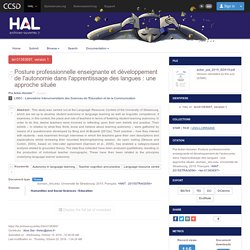
It examines, in this context, the place and role of teachers in terms of fostering student learning autonomy. In order to do this, twelve teachers were involved in reflecting upon their own beliefs and practice. Their beliefs – in relation to what they think, know and believe about learning autonomy – were gathered by means of a questionnaire developed by Borg and Al-Busaidi (2012a). Their practice – how they interact with students - was examined through interviews in which the teachers gave their own descriptions and explanations whilst reviewing their recorded teaching/learning session. An open coding (Strauss and Corbin, 2004), based on inter-rater agreement (Garrison et al., 2006), has enabled a category-based analysis related to grounded theory. L'autonomie, un objectif de formation. Approche de l'autonomie dans un dispositif en ligne : le cas du dispositif Le français en (première) ligne.
Pratiques pédagogiques et autonomie des étudiants de LI. Abstract : Autonomy is considered as one of the causes offailure of the first year students at university.
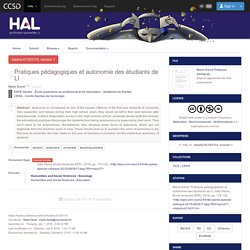
Very supported and helped during their high school years, they would be left to their own devices after baccalaureate. A direct observation survey in two high schools and an university shows quite the reverse: the educational practices discourage the students from being autonomous by supervising their work. They don't need to be autonomous. Nonetheless, they develop some forms of autonomy, which are not legitimate from the teachers' point of view.
These results lead us to question the norm of autonomy in the first year at university: the main stake in first year of bachelor is probably not the intellectual autonomy of students. Développer l'autonomie et favoriser l'utilisation de l'Internet : enjeux communs pour la mise en œuvre d'innovations pédagogiques. Recension de Héloïse Durler, L'autonomie obligatoire. Sociologie du gouvernement de soi à l'école, Presses universitaires de Rennes, 2015. Développer l'autonomie et favoriser l'utilisation de l'Internet : enjeux communs pour la mise en œuvre d'innovations pédagogiques. Au delà du couple "technologies éducatives - autonomie des étudiants" Abstract : In presentations on distance learning, educational technologies are often presented as the main lever capable of encouraging the autonomy of people in training.
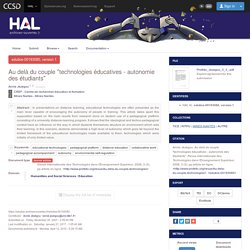
This article takes apart this supposition based on the main results from research done on student use of a pedagogical platform consisting of a university distance-learning program. It shows that the ideological and techno-pedagogical context have an influence on the way in which students themselves structure an environment which aids their learning. In this scenario, students demonstrate a high level of autonomy which goes far beyond the limited framework of the educational technologies made available to them, technologies which were initially of only limited value. Résumé : Dans les discours sur la formation à distance, les technologies éducatives sont souvent présentées comme le principal levier susceptible de favoriser l'autonomie des personnes en formation.
Favoriser l'autonomie et la créativité à travers une démarche par projets intégrant le numérique. Abstract : The courses of German as a language for specialists of other disciplines at Stendhal university in Grenoble (France) is more and more based on a project-based approach.
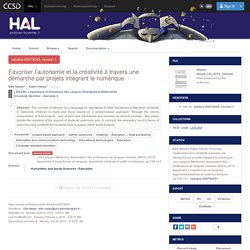
Through the (short) presentation of four projects - two of them are transversal and common to several courses - this paper tackles the question of the support of students' autonomy and, in contrast, the necessary input in terms of autonomy and creativity the students have to supply within these projects. L'autonomie, illusion ou projet de société ? Abstract : It is often thought that contemporary society is characterized by its actors' great autonomy.
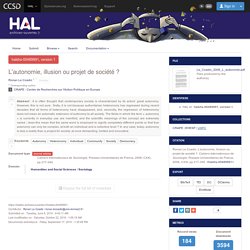
However, this is not sure : firstly, it is not because authoritarian heteronomy has regressed during recent decades that all forms of heteronomy have disappeared, and, secondly, the regression of heteronomy does not mean an automatic extension of autonomy to all society. The fields in which the term « autonomy » is currently in everyday use are manifold, and the scientific meanings of the concept are extremely varied ; does this mean that the same word is employed to signify completely different points or that true autonomy can only be complex, at both an individual and a collective level ?
In any case, today, autonomy is less a reality than a project for society, at once demanding, limited and innovative.